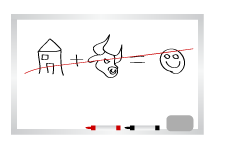The Rules of Investing Have Likely Been Permanently Rewritten
 The last 3-4 years have forced a complete rewrite of the investment principles that most people adhere to.
The last 3-4 years have forced a complete rewrite of the investment principles that most people adhere to. Before the "Great Recession" started in December of 2007, investors were expected to do two things to become wealthy:
1. Buy a home.
2. Pour money into the equity markets using a "buy and hold" strategy.
Buy and hold investing was seen as a surefire way to develop substantial amounts of wealth over the long-term. If you started early enough, according to common wisdom, then you were practically guaranteed a carefree retirement. If you didn't subscribe to that theory, then you would have someone wagging their finger in your face and telling you that "the markets always go up over the long-term".
Buy and hold investing proponents have taken a savage beating over the past couple of years. If you decided to invest money in the markets in the late '90s, then you are likely down over the past 11 years. When inflation is taken into account, most people have been downright slaughtered over that time.
Sure, the markets could come roaring back over the next number of years, and the "buy and hold" proponents will look like geniuses once again, but let's be real - there is a good chance that this won't happen. Exhibit A: the Nikkei 225. The Nikkei 225 (Japan) hit a high of about 39,000 in December of 1989. Over 20 years later, and the index hasn't even come close to hitting that level again. In fact, the Nikkei 225 is trading at just 9,368.04 today. A buy and hold strategy in Japan has failed miserably for the majority of the population.
--
It also appears as though the real estate market in the United States will remain depressed for some time to come as well. A few short years ago, real estate was seen as one of the safest investments on the planet. Now, not so much. The harsh reality is that the US real estate market still has a tremendous amount of excess to work off, and it will likely be some time before the US real estate market starts to post sustained gains once again.
--
The psychological wounds that have been inflicted since the beginning of the "Great Recession" will very likely be long-lasting, much like the wounds that were inflicted during the "Great Depression". I expect that the people who lived through the "Great Recession" will have permanently altered views on long-term investing, investing in the real estate market, etc.
So what will people invest in going forward? How will people allocate their retirement funds?
To start, I would expect the trend of Americans paying down their debt to continue. Significant progress has been made over the past two years when it comes to paying down expensive credit card debt, and I would expect this trend to continue for years to come.
Second - I expect the general public to become more hands-on with their own money. Over the past few years, a general distrust of stock brokers and Wall Street has blossomed into full-blown rage. In the late '90s, many Americans opened up discount brokerage accounts, which helped inflate the massive dot-com bubble. Over ten years later, and with a bit more wisdom, I expect this trend to pick up once again.
With buy and hold investing out of favor, I expect that short-term trading will make a resurgence. Many Americans actively traded their accounts in the late 90s, but this trend was halted by the sudden implosion of the markets in 2000. The natural tendency is for people to overtrade their own accounts, and I believe that we will see increased trading in the months and years ahead. Many Americans will simply not be content handing their money over to someone else, whether it be a full-service broker or mutual fund.
I also see Americans trying to build up their cash reserves, especially after the events of the past couple of years. In previous years and decades, holding large amounts of cash was frowned upon because the returns from other asset classes were so substantially larger. If the United States is to enter a period of deflation, then cash will become king once again. I would expect cash to comprise a much higher % of the average investor's portfolio in the years ahead.
--
When it comes to the US real estate market, a decline in speculative activity will lead to much more subdued returns in the decades ahead. Increased regulations will make it harder for people to move in and out of properties, and this will, in turn, make the real estate market a far less lucrative market to invest in.
There will ALWAYS be money to be made in the real estate market no matter what, but the truly crazy days are likely behind us. Many people with substantial sums of money to invest will likely find it easier/less of a headache to make money in other markets (in my opinion, of course).
--
There will always be ways to make money, with some of them being very lucrative. The world has changed though, and what worked 10 years ago might not work today. It's the investors who are willing to think outside of the box that will be handsomely rewarded in the decades ahead.
Filed under: General Knowledge



